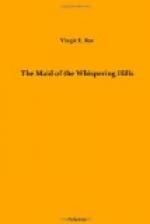They looked for the most part Scottish, these men, save here and there among them one who might be anything of the motley that came across each year.
In the first canoe a figure had risen and stood tall and straight among the bales of goods with which the craft was seen to be close packed from bow to stern, a figure striking in its lack of kinship to its surroundings, yet commanding in its beauty. Garments of cloth, of a gay blue shade and much adorned with trimming of gold braid, fitted close to the slender form of the man. His limbs from the knee were encased in leggings made, most evidently, in some leather shop, while tilted on his splendid head he wore a hat of so wide a brim that no sunlight touched either face or throat, while from beneath this covering there fell to his shoulder long curls of hair that shone like silk. This, evidently, was the leader of the party.
“Friends,” he said, “bound for the west and the country of the Saskatchewan.”
For all his appearance he spoke with the accent of the French, and for a moment McElroy looked closely at him.
“Of the Company?” he asked sharply.
“Aye,” said the other, with a little of wonder in voice and look, “of the Company, M’sieu most assuredly.”
The momentary flicker of uneasiness that had gripped the factor with the stranger’s speech died at his words.
So, of a surety, why not?
Had not he himself, born in the smoke of a London street, accepted with the ingenious adaptability of the Irish blood within him the very speech he now wondered at in the other?
As the young man sprang lightly to land he held out his hand, and it was gripped with a force that showed the spirit behind the beauty of this new guest.
“Welcome, M’sieu,” said the factor, “to Fort de Seviere and all it contains.”
“Bien!” laughed the other with a show of fine white teeth, “but it is good to behold neighbours in so deadly a wilderness as we have passed through for these many days. Naught but God-forgotten loneliness and never-ending forest. Yet it is for these that we barter the comforts of civilisation, eh, M’sieu, and waste ourselves on solitude and the savage?” He turned and waved his gloved hand over the five canoes, now curving one by one in to the landing, and shouted a few terse orders and commands.
“But I had nigh forgot, so unused am I to society and the usages thereof,”—he said, turning back with an engaging smile, “Alfred de Courtenay, known in that world across the water; and which my taste, or that of itself, more properly speaking, has caused me to forswear for some length of time, as Mad Alfred, I am, M’sieu—?”
“Anders McElroy,” supplied the other, “and factor of Fort de Seviere.”
“Monsieur le facteur, your servant, of French lineage, English nativity, and adventurous spirit.”
With a motion indescribably graceful he swept off his wide hat and executed a bow which in itself was proof of his gentleness.




